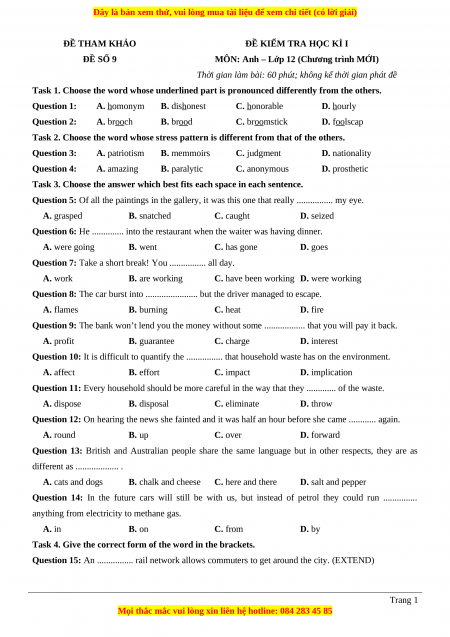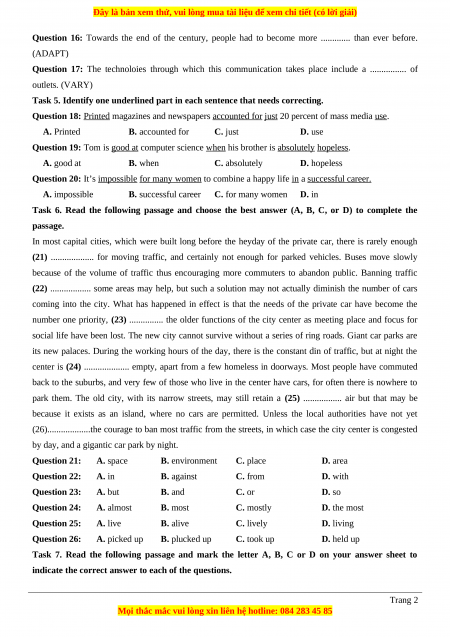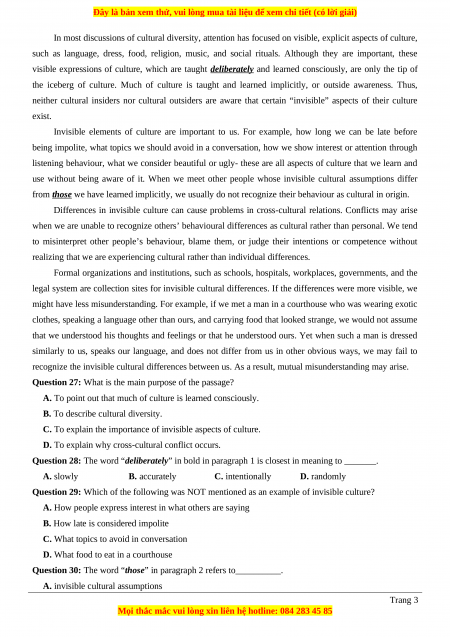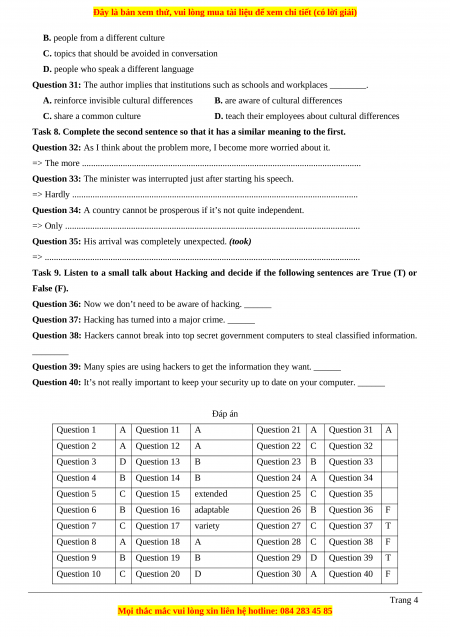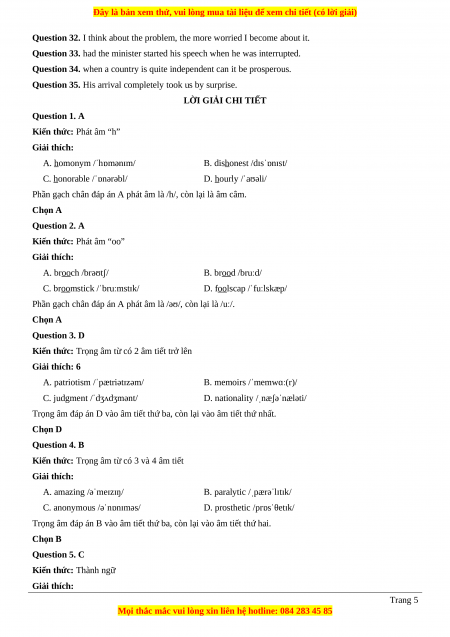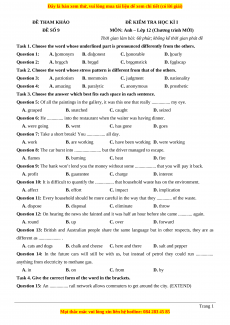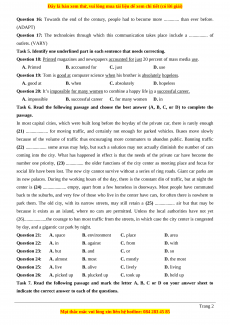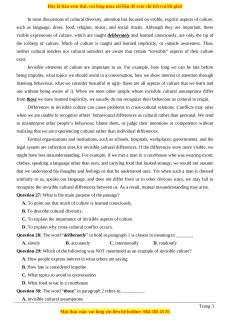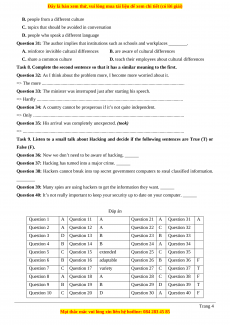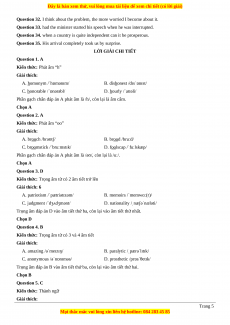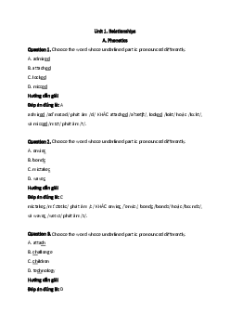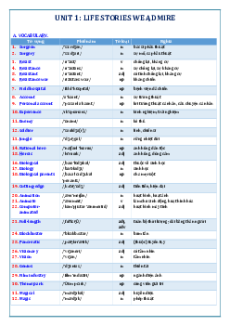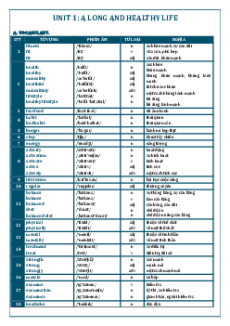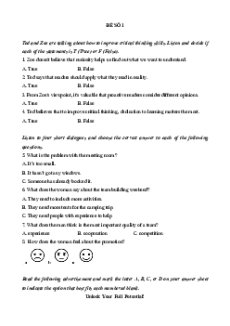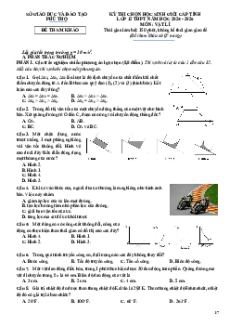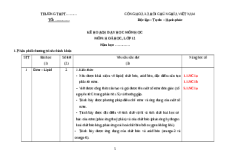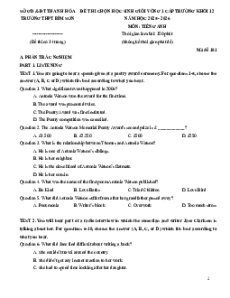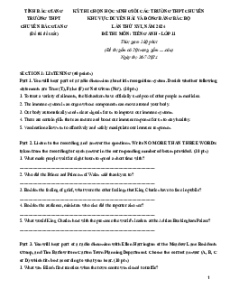ĐỀ THAM KHẢO
ĐỀ KIỂM TRA HỌC KÌ I ĐỀ SỐ 9
MÔN: Anh – Lớp 12 (Chương trình MỚI)
Thời gian làm bài: 60 phút; không kể thời gian phát đề
Task 1. Choose the word whose underlined part is pronounced differently from the others. Question 1: A. homonym B. dishonest C. honorable D. hourly Question 2: A. brooch B. brood C. broomstick D. foolscap
Task 2. Choose the word whose stress pattern is different from that of the others. Question 3: A. patriotism B. memmoirs C. judgment D. nationality Question 4: A. amazing B. paralytic C. anonymous D. prosthetic
Task 3. Choose the answer which best fits each space in each sentence.
Question 5: Of all the paintings in the gallery, it was this one that really ................ my eye. A. grasped B. snatched C. caught D. seized
Question 6: He .............. into the restaurant when the waiter was having dinner. A. were going B. went C. has gone D. goes
Question 7: Take a short break! You ................ all day. A. work B. are working
C. have been working D. were working
Question 8: The car burst into ....................... but the driver managed to escape. A. flames B. burning C. heat D. fire
Question 9: The bank won’t lend you the money without some .................. that you will pay it back. A. profit B. guarantee C. charge D. interest
Question 10: It is difficult to quantify the ................ that household waste has on the environment. A. affect B. effort C. impact D. implication
Question 11: Every household should be more careful in the way that they ............. of the waste. A. dispose B. disposal C. eliminate D. throw
Question 12: On hearing the news she fainted and it was half an hour before she came ............ again. A. round B. up C. over D. forward
Question 13: British and Australian people share the same language but in other respects, they are as
different as ................... . A. cats and dogs B. chalk and cheese C. here and there D. salt and pepper
Question 14: In the future cars will still be with us, but instead of petrol they could run ...............
anything from electricity to methane gas. A. in B. on C. from D. by
Task 4. Give the correct form of the word in the brackets.
Question 15: An ................ rail network allows commuters to get around the city. (EXTEND) Trang 1
Question 16: Towards the end of the century, people had to become more ............. than ever before. (ADAPT)
Question 17: The technoloies through which this communication takes place include a ................ of outlets. (VARY)
Task 5. Identify one underlined part in each sentence that needs correcting.
Question 18: Printed magazines and newspapers accounted for just 20 percent of mass media use. A. Printed B. accounted for C. just D. use
Question 19: Tom is good at computer science when his brother is absolutely hopeless. A. good at B. when C. absolutely D. hopeless
Question 20: It’s impossible for many women to combine a happy life in a successful career. A. impossible B. successful career C. for many women D. in
Task 6. Read the following passage and choose the best answer (A, B, C, or D) to complete the passage.
In most capital cities, which were built long before the heyday of the private car, there is rarely enough
(21) ................... for moving traffic, and certainly not enough for parked vehicles. Buses move slowly
because of the volume of traffic thus encouraging more commuters to abandon public. Banning traffic
(22) .................. some areas may help, but such a solution may not actually diminish the number of cars
coming into the city. What has happened in effect is that the needs of the private car have become the
number one priority, (23) ............... the older functions of the city center as meeting place and focus for
social life have been lost. The new city cannot survive without a series of ring roads. Giant car parks are
its new palaces. During the working hours of the day, there is the constant din of traffic, but at night the
center is (24) .................... empty, apart from a few homeless in doorways. Most people have commuted
back to the suburbs, and very few of those who live in the center have cars, for often there is nowhere to
park them. The old city, with its narrow streets, may still retain a (25) ................. air but that may be
because it exists as an island, where no cars are permitted. Unless the local authorities have not yet
(26)...................the courage to ban most traffic from the streets, in which case the city center is congested
by day, and a gigantic car park by night. Question 21: A. space B. environment C. place D. area Question 22: A. in B. against C. from D. with Question 23: A. but B. and C. or D. so Question 24: A. almost B. most C. mostly D. the most Question 25: A. live B. alive C. lively D. living Question 26: A. picked up B. plucked up C. took up D. held up
Task 7. Read the following passage and mark the letter A, B, C or D on your answer sheet to
indicate the correct answer to each of the questions. Trang 2
In most discussions of cultural diversity, attention has focused on visible, explicit aspects of culture,
such as language, dress, food, religion, music, and social rituals. Although they are important, these
visible expressions of culture, which are taught deliberately and learned consciously, are only the tip of
the iceberg of culture. Much of culture is taught and learned implicitly, or outside awareness. Thus,
neither cultural insiders nor cultural outsiders are aware that certain “invisible” aspects of their culture exist.
Invisible elements of culture are important to us. For example, how long we can be late before
being impolite, what topics we should avoid in a conversation, how we show interest or attention through
listening behaviour, what we consider beautiful or ugly- these are all aspects of culture that we learn and
use without being aware of it. When we meet other people whose invisible cultural assumptions differ
from those we have learned implicitly, we usually do not recognize their behaviour as cultural in origin.
Differences in invisible culture can cause problems in cross-cultural relations. Conflicts may arise
when we are unable to recognize others’ behavioural differences as cultural rather than personal. We tend
to misinterpret other people’s behaviour, blame them, or judge their intentions or competence without
realizing that we are experiencing cultural rather than individual differences.
Formal organizations and institutions, such as schools, hospitals, workplaces, governments, and the
legal system are collection sites for invisible cultural differences. If the differences were more visible, we
might have less misunderstanding. For example, if we met a man in a courthouse who was wearing exotic
clothes, speaking a language other than ours, and carrying food that looked strange, we would not assume
that we understood his thoughts and feelings or that he understood ours. Yet when such a man is dressed
similarly to us, speaks our language, and does not differ from us in other obvious ways, we may fail to
recognize the invisible cultural differences between us. As a result, mutual misunderstanding may arise.
Question 27: What is the main purpose of the passage?
A. To point out that much of culture is learned consciously.
B. To describe cultural diversity.
C. To explain the importance of invisible aspects of culture.
D. To explain why cross-cultural conflict occurs.
Question 28: The word “deliberately” in bold in paragraph 1 is closest in meaning to _______. A. slowly B. accurately C. intentionally D. randomly
Question 29: Which of the following was NOT mentioned as an example of invisible culture?
A. How people express interest in what others are saying
B. How late is considered impolite
C. What topics to avoid in conversation
D. What food to eat in a courthouse
Question 30: The word “those” in paragraph 2 refers to__________.
A. invisible cultural assumptions Trang 3
B. people from a different culture
C. topics that should be avoided in conversation
D. people who speak a different language
Question 31: The author implies that institutions such as schools and workplaces ________.
A. reinforce invisible cultural differences
B. are aware of cultural differences
C. share a common culture
D. teach their employees about cultural differences
Task 8. Complete the second sentence so that it has a similar meaning to the first.
Question 32: As I think about the problem more, I become more worried about it.
=> The more ...........................................................................................................................
Question 33: The minister was interrupted just after starting his speech.
=> Hardly ..............................................................................................................................
Question 34: A country cannot be prosperous if it’s not quite independent.
=> Only ..................................................................................................................................
Question 35: His arrival was completely unexpected. (took)
=> ...........................................................................................................................................
Task 9. Listen to a small talk about Hacking and decide if the following sentences are True (T) or False (F).
Question 36: Now we don’t need to be aware of hacking. ______
Question 37: Hacking has turned into a major crime. ______
Question 38: Hackers cannot break into top secret government computers to steal classified information. ________
Question 39: Many spies are using hackers to get the information they want. ______
Question 40: It’s not really important to keep your security up to date on your computer. ______ Đáp án Question 1 A Question 11 A Question 21 A Question 31 A Question 2 A Question 12 A Question 22 C Question 32 Question 3 D Question 13 B Question 23 B Question 33 Question 4 B Question 14 B Question 24 A Question 34 Question 5 C Question 15 extended Question 25 C Question 35 Question 6 B Question 16 adaptable Question 26 B Question 36 F Question 7 C Question 17 variety Question 27 C Question 37 T Question 8 A Question 18 A Question 28 C Question 38 F Question 9 B Question 19 B Question 29 D Question 39 T Question 10 C Question 20 D Question 30 A Question 40 F Trang 4
Đề thi học kì 1 Tiếng anh 12 năm 2022 - 2023 (Đề 9)
CÁCH MUA:
- B1: Gửi phí vào TK:
1133836868- CT TNHH DAU TU VA DV GD VIETJACK - Ngân hàng MB (QR) - B2: Nhắn tin tới Zalo VietJack Official ( nhấn vào đây ) để xác nhận thanh toán và tải tài liệu - giáo án
Liên hệ ngay Hotline hỗ trợ: 084 283 45 85
Đề thi được cập nhật liên tục trong gói này từ nay đến hết tháng 6/2023. Chúng tôi đảm bảo đủ số lượng đề đã cam kết hoặc có thể nhiều hơn, tất cả có BẢN WORD, LỜI GIẢI CHI TIẾT và tải về dễ dàng.
Để tải tài liệu gốc về máy bạn click vào nút Tải Xuống ở trên!
Thuộc bộ (mua theo bộ để tiết kiệm hơn):
-
Tailieugiaovien.com.vn giới thiệu bộ 36 đề thi học kì 1 môn Tiếng Anh lớp 12 mới nhất năm 2022 - 2023 nhằm giúp Giáo viên có thêm tài liệu tham khảo ra đề thi Tiếng anh lớp 12.
-
File word có lời giải chi tiết 100%.
-
Mua trọn bộ sẽ tiết kiệm hơn tải lẻ 50%.
Đánh giá
4.6 / 5(571 )Trọng Bình
Giúp ích cho tôi rất nhiều
Duy Trần
Rất thích tài liệu bên VJ soạn (bám sát chương trình dạy)
TÀI LIỆU BỘ BÁN CHẠY MÔN Tiếng Anh
Xem thêmTÀI LIỆU BỘ BÁN CHẠY Lớp 12
Xem thêmTài liệu bộ mới nhất





